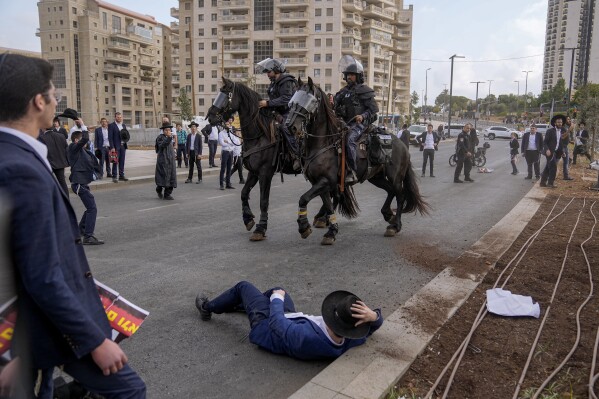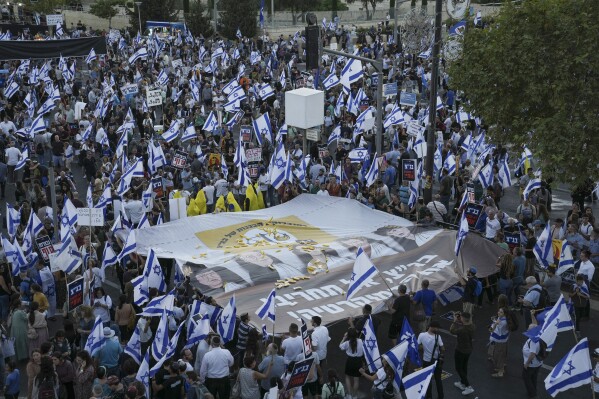Israeli police arrest suspects for spitting near Christian pilgrims and churches in Jerusalem
JERUSALEM (AP) — Israeli police said Wednesday they arrested several people suspected of spitting in the direction of Christian pilgrims and churches in Jerusalem this week as religious tensions flared anew in the contested capital that the three Abrahamic faiths consider holy.
As Jews celebrate Sukkot — the weeklong Feast of Tabernacles that marks the fall harvest and commemorates the desert wandering of the Jews during the Exodus — processions of ultra-Orthodox Jews through the Old City’s narrow streets have led to numerous spitting incidents and left Jerusalem on edge.
One person was detained after a spitting incident from one of the processions was caught on video and provoked widespread outrage on social media. The video, first captured by an Israeli hotline for anti-Christian assaults, shows ultra-Orthodox Jews spitting at the feet of foreign Christian worshipers in the Old City of Jerusalem.
Police also arrested five other people for allegedly spitting toward churches on Wednesday. One was charged with assault, and four were charged with unlawful disorderly conduct, police said.
 Israeli police shoot a Palestinian after he allegedly stabbed a guard at a Jerusalem train station
Israeli police shoot a Palestinian after he allegedly stabbed a guard at a Jerusalem train station
 Ultra-Orthodox men block Jerusalem traffic in protest against Israeli military draft
Ultra-Orthodox men block Jerusalem traffic in protest against Israeli military draft
 Thousands rally in support of Israel’s judicial overhaul before a major court hearing next week
Thousands rally in support of Israel’s judicial overhaul before a major court hearing next week
Videos spread on social media Wednesday showed a procession of ultra-Orthodox Jews celebrating Sukkot and spitting at the entrance to an ancient church in Jerusalem. The site, where tradition holds that Jesus was whipped on Pontius Pilate’s orders, is known as the Church of Flagellation.
Such footage has stirred concerns of rising intolerance among religious Jews and drew rare condemnation on Tuesday from Israel’s official rabbi, Prime Minister Benjamin Netanyahu and other senior officials.
Regional ally Jordan on Wednesday added to the outcry, with the foreign ministry saying it had sent a complaint to the Israeli Embassy condemning the spate of anti-Christian incidents. Neighboring Jordan is the official custodian of the Al-Aqsa Mosque compound, the most sensitive and contested holy site in Jerusalem, which Jews revere as the Temple Mount.
Police said they would launch a probe into acts of anti-Christian hate, ramp up surveillance in the Old City — where winding stone alleyways already teem with security cameras — and consider imposing fines on perpetrators.
Christians — the vast majority of whom are Palestinians who consider themselves to be living under occupation in Israeli-annexed east Jerusalem — have linked the uptick in anti-Christian vandalism and attacks to Netanyahu’s far-right government, which they say is emboldening Jewish extremists.
This week has been particularly tense, with ultra-Orthodox Jews carrying ritual palm fronds for Sukkot parading through the Via Dolorosa, where Christians believe Jesus hauled his cross toward his crucifixion, in the Old City, alongside Christian pilgrims.
Christian advocates accuse the government of neglecting their complaints and authorities of doing little or nothing to stop a rise in religiously motivated harassment.
Some Israeli ministers denounced spitting at clergy. But other Netanyahu allies were more equivocal.
Israeli media reported that coalition lawmaker Simcha Rothman had joined a Sukkot march during which ultra-Orthodox Jews spit at churches. The reports said that Rothman’s brother, Rabbi Natan Rothman, led the parade.
The lawmaker’s spokesperson, Odelya Azulay, confirmed that Rothman had participated his brother’s religious procession on Wednesday but denied any spitting occurred at the event.
Israeli National Security Minister Itamar Ben-Gvir, who oversees the country’s police force, told Israel’s Army Radio on Wednesday that “spitting on Christians is not a criminal case.”
“Not everything is worth imprisonment,” Ben-Gvir added.
His comment fueled more outrage, particularly among Palestinians.
“This official rhetoric unearths the deep-rooted racism and prejudice infecting Israeli society,” Dimitri Diliani, a senior member of Palestinian President Mahmoud Abbas’ secular nationalist Fatah party and president of the National Christian Coalition of the Holy Land.
Israel captured east Jerusalem — along with the West Bank and Gaza Strip — in the 1967 Mideast war and later annexed it in a move not internationally recognized.
Disclaimer: The copyright of this article belongs to the original author. Reposting this article is solely for the purpose of information dissemination and does not constitute any investment advice. If there is any infringement, please contact us immediately. We will make corrections or deletions as necessary. Thank you.




